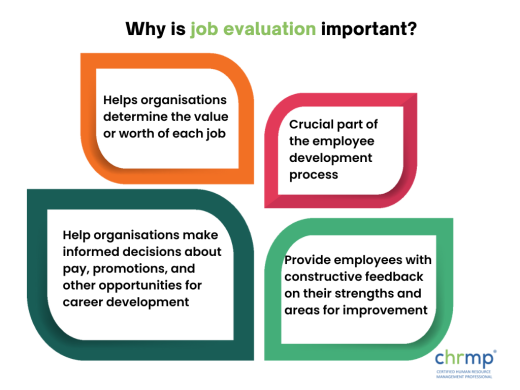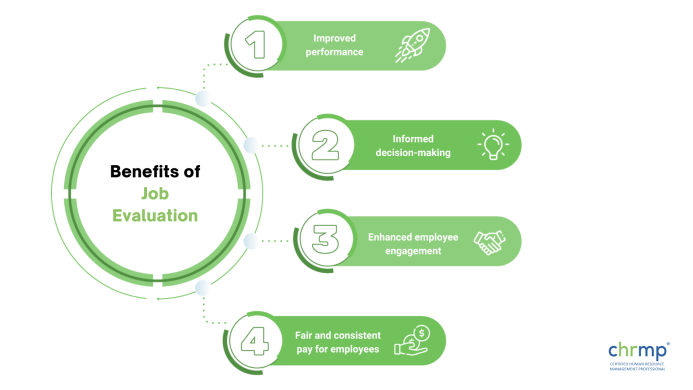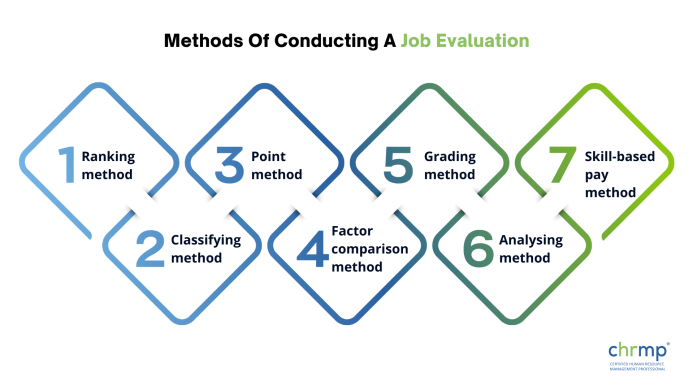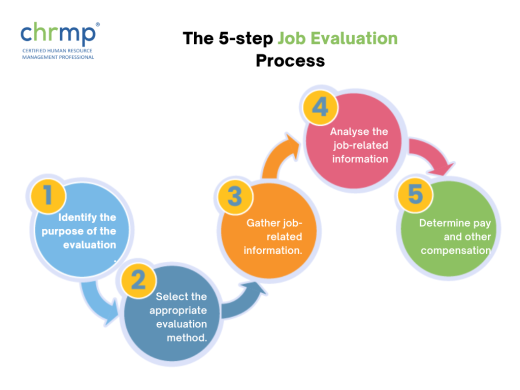

Companies all around the globe spend valuable resources and time into evaluating employee performance. In this Job Evaluation blog, we shall discuss the definition, importance, benefits, methods, and also explain the 5-step process in detail.
While specific details might vary with each company, the main focus for each evaluation is usually the same, that is, helping employees in the company identify their weak areas by providing constructive feedback on their performance.
This also helps companies make informed decisions about pay, promotions, and other career development opportunities.
Evaluations are a vital part of the employee development process. But what exactly is the purpose of a job evaluation, and how effective are they in practice? We’re going to discuss just that!
So without further ado, let’s get started with the most basic question:

Job evaluation is the process of assessing the value or worth of a particular job within an organisation. It involves comparing a job’s duties, responsibilities, and required skills with those of other jobs in the company to determine its appropriate place in the organisation’s hierarchy and pay scale.
There are several methods used by organisations to evaluate jobs. These methods include the classifying method, the ranking method, factor comparison method, and the point method.
These methods involve ranking or grouping jobs based on their characteristics and responsibilities, assigning points to various factors, or comparing jobs based on specific factors such as knowledge, skills, and accountability.
The methods used for evaluating jobs will be discussed in a separate section of this blog.
Job evaluation ensures that jobs within an organisation are pretty compensated and that there is consistency in determining compensation and pay. It can also help organisations make informed decisions about promotions, career development opportunities, and other personnel matters.
Job evaluation is essential because it helps organisations determine the value or worth of each job within the company. This process involves comparing each job’s duties, responsibilities, and required skills with those of other jobs in the organisation to determine its appropriate place in the hierarchy and pay scale.

According to a survey conducted by the human resources software company Workforce Solutions, 63% of employees feel that their performance review accurately reflects their job performance. However, only 41% of employees believe that their performance review is conducted fairly and objectively. Additionally, the survey found that 55% of employees feel that their performance review does not provide helpful feedback that can be used to improve their job performance.
These findings suggest that while many employees believe their performance review accurately reflects their job performance, there is room for improvement in how these evaluations are conducted. Improving the fairness and objectivity of the evaluation process and providing more helpful and actionable feedback can increase the effectiveness of evaluations and ensure that they are a valuable tool for both employees and organisations.
However, there needs to be more debate about the effectiveness of traditional methods to evaluate jobs. A study by the consulting firm Deloitte found that only 34% of employees feel that their performance review accurately reflects their contributions to the company. Additionally, nearly half of the employees believe their performance review needs to be a more fair and accurate assessment of their work.
Despite these challenges, it is clear that evaluating jobs is a crucial part of the employee development process. They provide employees with constructive feedback on their strengths and areas for improvement and help organisations make informed decisions about pay, promotions, and other opportunities for career development.
There are several specific benefits of job evaluation:

1. Fair and consistent pay: Evaluation helps ensure that employees are fairly compensated based on the value of their job and individual performance. It helps to establish a uniform pay scale for different jobs within the organisation and avoid pay disparities based on gender, race, or other biases.
2. Improved performance: Job evaluation provides employees with constructive feedback on their strengths and areas for improvement. This can motivate employees to perform at their best and identify personal and professional development opportunities.
3. Informed decision-making: Job evaluation can help organisations to make informed decisions about promotions, career development opportunities, and other personnel matters. By understanding the value and requirements of each job, organisations can better align their staffing and resources with their goals and objectives.
4. Enhanced employee engagement: When employees feel that they are being fairly compensated and recognised for their contributions, they are more likely to be engaged and committed to the organisation. Evaluation can improve employee engagement by providing transparency and fairness in determining pay and opportunities.
5. Facilitates organisational design and structure: A comprehensive job evaluation process helps organisations define clear hierarchies, reporting relationships, and job responsibilities. This clarity aids in creating a more streamlined organisational structure, reducing confusion and overlap in roles.
6.Supports compliance and legal standards: Job evaluation ensures that organisations comply with labor laws and regulations by maintaining consistent and unbiased compensation practices. It reduces the risk of litigation related to wage disputes or discrimination claims.
7.Attracts and retains talent: A well-structured job evaluation process contributes to competitive and equitable compensation packages. This not only helps attract top talent but also boosts employee retention by fostering a sense of value and security.
8.Promotes internal equity and harmony: Job evaluation creates transparency around how roles are valued within the organisation. Employees understand how their positions compare to others, fostering a sense of fairness and reducing potential conflicts or dissatisfaction related to compensation or job expectations.
Organisations use several methods to evaluate jobs and determine their value or worth within the company. These methods include:

Let’s discuss these methods further.
1. Ranking method: This involves ranking each job in an organisation from the highest to the lowest in terms of importance or value.
2. Classifying method involves grouping jobs into classes or categories based on their characteristics and responsibilities.
3. Point method: This involves assigning specific points to various factors such as skills, knowledge, and experience required for a job. The total number of points is then used to determine the job’s place in the organisation’s hierarchy and pay scale.
4. Factor comparison method involves comparing jobs based on specific factors such as knowledge, skills, and responsibility and determining their relative worth.
5. Grading method involves assigning grades to jobs based on their characteristics and responsibilities. The grades are then used to determine the job’s place in the organisation’s hierarchy and pay scale.
6. Analysing method: This involves breaking down the duties and responsibilities of each job into specific tasks and analysing the skills and knowledge required to perform those tasks.
7. Skill-based pay method: This involves setting pay rates based on the specific skills and knowledge required for a job rather than on the job title or level within the organisation.
Overall, the choice of evaluation method will depend on the specific needs and goals of the organisation. Some methods may be more suitable for particular jobs or industries, while others may be more appropriate for different organisational structures or cultures.
The specific steps involved in an evaluation process will depend on the method used and the organisation’s particular needs and goals. However, here are five general steps that are typically followed in a job evaluation process:

Let’s discuss these steps in more detail.
1. Identify the purpose of the evaluation
The first step in the process is to clarify the specific goals that the organisation hopes to achieve through the job evaluation. This may include determining pay scales, identifying training and development needs, or making decisions about promotions and career advancement.
2. Select the appropriate evaluation method
The next step is to choose the most suitable method for evaluating the jobs within the organisation. Different ways may be more appropriate for different types of jobs or industries, organisational structures, or cultures. Some standard job evaluation methods include ranking, classifying, point evaluation, factor comparison, grading, and skill-based pay.
3. Gather job-related information

The third step is to gather detailed information about the duties, responsibilities, and required skills of each job being evaluated. This may involve reviewing job descriptions, observing employees performing their tasks, and gathering input from employees, supervisors, and other stakeholders.
4. Analyse the job-related information
Once the job-related information has been gathered, it must be analysed to determine each job’s relative value or worth. This may involve comparing the duties and responsibilities of each job with those of other positions within the organisation or using a specific job evaluation method such as ranking, classifying, or point evaluation.
5. Determine pay and other compensation
Based on the job evaluation results, the organisation can then determine the appropriate payment and further compensation for each job. This may involve establishing pay scales or ranges, setting individual pay rates, or making decisions about bonuses or other incentives. The job evaluation results should also be communicated to employees and other stakeholders to ensure transparency and understanding.
Organizations should conduct job evaluation during the following scenarios:
In conclusion, job evaluation is a valuable tool for organisations to ensure that their staffing and compensation practices are fair, consistent, and aligned with their goals and objectives.
By evaluating the duties, responsibilities, and required skills of each job within the organisation, organisations can determine the relative value or worth of each job and make informed decisions about pay and other compensation, as well as about promotions and other career development opportunities.
While there are different methods that organisations can use to conduct evaluations, it is essential to choose the most appropriate method based on the specific needs and goals of the organisation and to ensure that the evaluation process is fair, objective, and practical.
By taking these steps, organisations can improve employee performance and engagement and create a positive and supportive work environment for all employees.
1. What is the difference between job analysis and job evaluation?
Job analysis is the process of gathering, examining, and documenting the duties, tasks, and responsibilities of a particular job. On the other hand, job evaluation assesses the value or worth of a position within an organisation. Job analysis provides detailed information used in the job evaluation process to determine a job’s relative value or worth.
2. How often should job evaluations be conducted?
The frequency of evaluations will depend on the specific needs and goals of the organisation. Some companies may conduct evaluations annually, while others may do so more frequently, such as every six months or every quarter. It is essential for organisations to establish a detailed schedule for job evaluations and to communicate this schedule to employees.
3. Can job evaluations be used to determine pay raises or promotions?
Yes, job evaluations can be used to determine pay raises or promotions. By understanding the value or worth of each job within the organisation, organisations can make informed decisions about pay and other compensation, as well as about promotions and other career development opportunities.
4. How can job evaluations be used to improve employee performance?
Job evaluations provide employees with constructive feedback on their strengths and areas for improvement, which can motivate them to perform at their best. In addition, job evaluations can help organisations identify any training or development needs for individual employees or the organisation, which can improve overall performance.
5. Can employees appeal to the results of a job evaluation?
Yes, employees may have the opportunity to appeal the results of an evaluation if they feel it is unfair or inaccurate. Organisations should have a straightforward process for employees to raise any concerns or issues with the evaluation process.
6. What is meant by job evaluation?
Job evaluation is the process of assessing the value or worth of a particular job within an organisation. It involves comparing a job’s duties, responsibilities, and required skills with those of other jobs in the company to determine its appropriate place in the organisation’s hierarchy and pay scale. This ensures fair compensation, consistency in pay decisions, and alignment with the organisation’s goals.
7. What are the 5 job evaluation methods?
8. When should job evaluation be done?
Job evaluation should be conducted during the following scenarios:
9. What is the 5-step Job Evaluation Process?
The 5-step job evaluation process involves the following steps:
This structured approach ensures that job evaluation is fair, consistent, and aligned with the organisation’s objectives.
© 2007-2025 CHRMP| All Rights Reserved | Powered by Ripples Learning & Research Private Limited

Fill in the below details to get a HRBP Advanced Program Plan.
